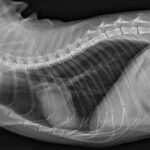What is it?
Kennel cough is an infection of trachea and broncheal region of dogs. Affected animals have a harsh, hacking cough that most people describe as sounding like something stuck in my dog’s throat.
This bronchitis may be of brief duration and mild enough to warrant minimal treatment(this is how most cases work). In rare instances, symptoms may progress all the way to a life-threatening pneumonia depending on which infectious agents are involved and the immunological strength of the patient.
An uncomplicated kennel cough runs a course averaging 7-9 days and entails frequent fits of coughing in a patient who otherwise feels active and normal. Uncomplicated cases do not involve fever or listlessness, just lots of coughing.
While the main agent involved is the bordetella bacteria, numerous organisms may be involved in a case with the following organisms frequently occur concurrently to create a case of kennel cough:
- Bordetella bronchiseptica (bacteria)
- Parainfluenza virus
- Adenovirus type 2
- Canine distemper virus
- Canine influenza virus
- Canine herpesvirus (very young puppies)
- Mycoplasma canis (a single-cell organism that is neither virus nor bacterium)
- Canine reovirus
- Canine respiratory coronavirus.
The classical combination for uncomplicated kennel cough is infection with parainfluenza or adenovirus type 2 in combination with Bordetella bronchiseptica. Infections involving the distemper virus, Mycoplasma species, or canine influenza are more prone to progressing to pneumonia.
How Infection Occurs
An infected dog sheds infectious bacteria and/or viruses in respiratory secretions. These secretions become aerosolized and float in the air where they can be inhaled by a healthy dog. Obviously, crowded housing and suboptimal ventilation play important roles in the likelihood of transmission but organisms may also be transmitted on toys, food bowls or other objects.

Mucociliary Escalator.
Dogs get infected when they are kept in a crowded situation with poor air circulation and lots of warm air (i.e., a boarding kennel, vaccination clinic, obedience class, local park, animal shelter, animal hospital waiting room, or grooming parlor). In reality, most causes of coughing that begin acutely in a dog are due to infectious causes and usually represent some form of kennel cough.
The incubation period is 2 – 14 days. Dogs are typically sick for 1 to 2 weeks. Infected dogs shed Bordetella organism for a period of time following infection.
How is Diagnosis Made?
A coughing dog that has a poor appetite, fever, and/or listlessness should be evaluated for pneumonia.
Usually the history of exposure to a crowd of dogs within the proper time frame, plus typical examination findings (coughing dog that otherwise feels well) is adequate to make the diagnosis. Radiographs show bronchitis and are particularly helpful in determining if there is a complicating pneumonia.
Recently, PCR (polymerase chain reaction) panels have become available in many reference laboratories. Using technology to amplify the presence of DNA in a swab, the lab is able to test for most of the kennel cough infectious agents listed. This knowledge is helpful in guiding therapy and understanding expectations.
How is Kennel Cough Treated?
An uncomplicated case of kennel cough will go away by itself. Cough suppressants can improve patient comfort while the infection is resolving. An antibiotic targeting Bordetella can also be used. The dog should be clearly improved, if not recovered, after about a week.
It is important to distinguish an uncomplicated case of kennel cough from one complicated by pneumonia for obvious reasons. The uncomplicated cases will not have fever or appetite loss and they will not be listless. As mentioned, they will seem normal except for coughing. Dogs with pneumonia appear sick.
Prevention through Vaccination
Nasal Vaccine
Vaccination is only available for: Bordetella bronchiseptica, canine adenovirus type 2, canine parainfluenza virus, canine distemper, and canine influenza. Infections with other members of the kennel cough complex cannot be prevented. Vaccine against adenovirus type 2, parainfluenza, and canine distemper is generally included in the basic puppy series and subsequent boosters (the DHPP or distemper-parvo shot). There is some controversy regarding which method provides a better immunization for parainfluenza virus or if a combination of both formats is best.
Oral Vaccine
For Bordetella bronchiseptica only, an oral vaccination is available, which is well tolerated by dogs.
Intranasal and orals vaccinations may be given as early as 3 weeks of age and immunity generally lasts 12 to 13 months. The advantage is that the local immunity is stimulated right at the site where the natural infection would try to take hold.
It takes four to 10 days to generate a solid immune response after intranasal or oral vaccination, so it is best if vaccination is given at prior to the exposure risk. Some dogs will have some sneezing or nasal discharge in the week following intranasal vaccination; this should clear up on its own. As a general rule, nasal vaccination provides faster immunity than injectable vaccination.
Nasal vaccines for Bordetella generally also include vaccine against parainfluenza virus and some also include vaccine against adenovirus type 2.
Injectable Vaccine
Injectable vaccination is a good choice for aggressive dogs who may bite if their muzzle is approached. For puppies, injectable vaccination provides good systemic immunity as long as two doses are given (approximately one month apart) after age 4 months. Boosters are generally given annually. Some dogs experience a small lump under the skin at the injection site. This should resolve without treatment.
Vaccination is not useful in a dog already incubating kennel cough.
Bordetella bronchiseptica vaccination may not prevent infection. In some cases, vaccination minimizes symptoms of illness but does not entirely prevent infection. This is true whether nasal, oral or injectable vaccine is used.
Dogs that have recovered from Bordetella bronchiseptica are typically immune to reinfection for 6 to 12 months.
What if Kennel Cough doesn’t Improve?
As previously noted, this infection is generally self-limiting. It should be at least improved partially after one week of treatment. If no improvement has been observed in this time, a re-check exam (likely including x-rays of the chest) would be a good idea. If symptoms continue this suggests pneumonia or another underlying disease entirely. If you have questions about a coughing dog, do not hesitate to bring them to your veterinarian.


